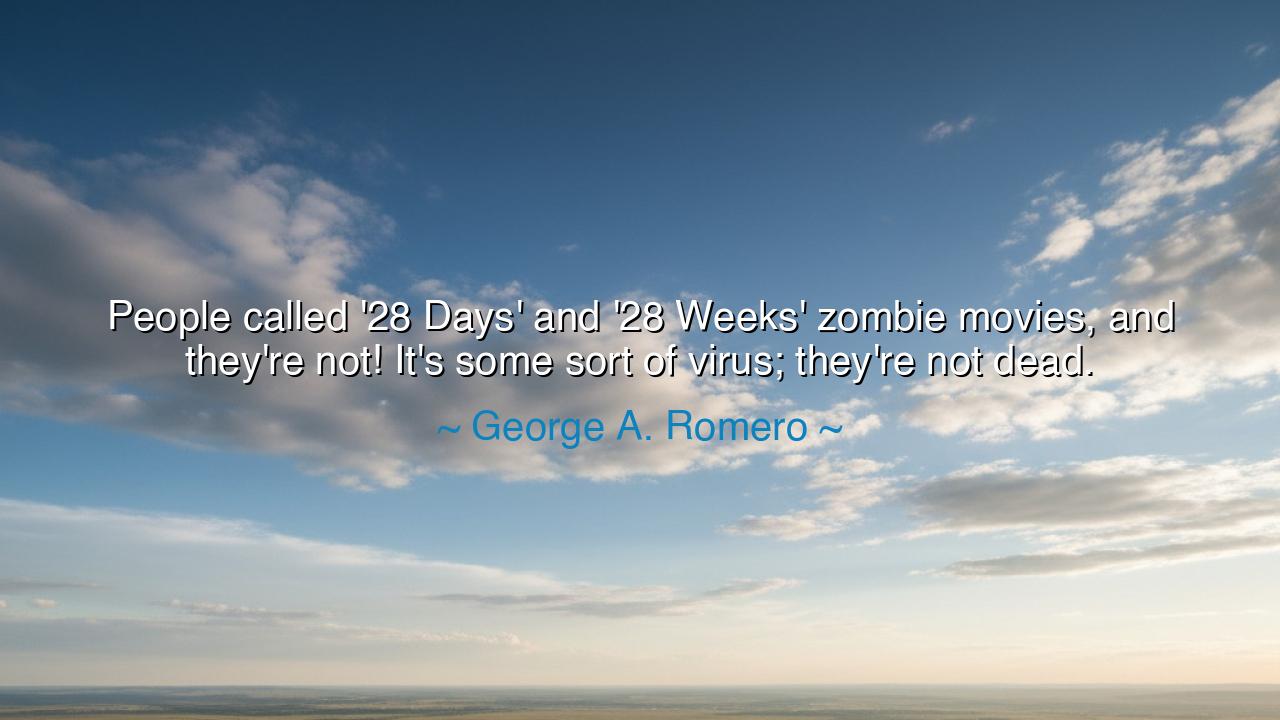
People called '28 Days' and '28 Weeks' zombie movies, and
People called '28 Days' and '28 Weeks' zombie movies, and they're not! It's some sort of virus; they're not dead.






The words of George A. Romero, wise and profound, echo through time, inviting us to ponder the nature of life, death, and the choices we make when faced with calamity. "People called '28 Days' and '28 Weeks' zombie movies, and they're not! It's some sort of virus; they're not dead." These words, a simple declaration, carry within them the weight of wisdom and understanding. They call us to see beyond the surface, to look deeper into the nature of the world around us, and to question what it truly means to live and to die.
In this statement, Romero challenges the very idea of death as we know it. The world often defines life and death by the visible signs—the stillness of the body, the absence of breath, the silence of the heart. Yet Romero's words call us to ask: what if these markers are not the full truth? What if the line between life and death is not so easily drawn? "It's some sort of virus; they're not dead," he reminds us. The creatures in the film, victims of a disease, are not dead in the traditional sense. They move, they act, they are driven by a primal force, but they have lost the essence of what makes them truly human. Their bodies are alive, but their souls have been taken by the disease, their humanity stripped away.
This brings us to a deeper understanding of humanity's fragility and the profound impact of external forces on the human spirit. In ancient times, the wisdom of elders often spoke of how the world could change in an instant—how plagues, war, and the unpredictable forces of nature could transform the very fabric of society. The Black Death that swept across Europe in the 14th century serves as a haunting reminder of such transformations. It was not the dead who were feared so much as the living who became something else—who, by the force of disease, were no longer the people they had once been. The plague did not kill the body alone; it killed the soul, the essence of life itself.
Romero’s quote does more than speak to the realm of horror films; it calls us to see the vulnerabilities that lie beneath the surface of every living being. It calls us to recognize that life is not merely a physical state but something far deeper, far more mysterious. The virus in his films is not just a threat to the body but to the mind, to the spirit. It challenges the very essence of what it means to be human. A loss of humanity is not a result of death, but a result of what happens when one’s soul is overtaken by a greater force. It is this battle of the spirit that Romero points us to. To be alive is not merely to breathe, but to have control over one's own will, to remain steadfast in the face of overwhelming darkness.
In every age, the struggle against such forces—be they disease, war, or the darker aspects of human nature—has been a central part of the human condition. And yet, it is in these struggles that the greatest lessons are often learned. Take, for example, the story of Hannibal Barca, the great Carthaginian general who led his army across the Alps to face the mighty Roman legions. He faced what seemed like an insurmountable challenge, yet through sheer will, cunning, and perseverance, he defied the odds. He was not defeated by the force of the enemy alone, but by the forces within himself—his own doubt, his own weariness. The battle is not always against the outside world but against the forces that seek to corrupt the soul.
We, too, must remember that we are not merely bodies that breathe—we are souls that seek meaning, purpose, and connection. In a world that often pushes us to conform, to surrender to the pressures of the moment, we must not forget that our true strength lies not in our physical form, but in the resilience of our spirit. The virus in Romero's films does not take away life; it takes away the essence of what makes life worth living—the connection to others, the ability to think, to reason, to love.
Thus, let us take from Romero’s wisdom a powerful lesson for our own time. The challenges we face—whether in the form of disease, war, or societal collapse—may seem overwhelming, but we must not lose sight of what truly makes us human. In the face of adversity, we must hold fast to our humanity, to the essence of who we are. We must not let the forces of life strip us of our spirit, for it is our spirit that defines us.
As we move forward, let us commit ourselves to preserving that spark of life within us, not just the breath that fills our lungs but the fire that fuels our souls. In every moment of struggle, let us remember that the greatest victory is not the defeat of the body, but the preservation of the heart and the mind. We must not allow the world, in all its dark forces, to make us something we are not. Instead, let us strive to be ever more deeply and truly human, carrying forward the legacy of wisdom passed down to us, as guardians of life and spirit in a world ever teetering on the brink of change.






AAdministratorAdministrator
Welcome, honored guests. Please leave a comment, we will respond soon